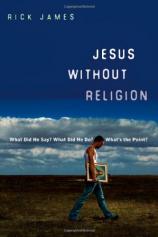Jesus Without Religion: What Did He Say? What Did He Do? What's the Point?
Review
Jesus Without Religion: What Did He Say? What Did He Do? What's the Point?
I'm going to go out on a very short limb here and speculate that no one in history --- no one --- has been more misunderstood, more subject to misinterpretation, and more burdened with layers of distortion than has the person of Jesus Christ. This is not to suggest that there is but one crystal-clear image of Him that we can consider to be accurate. But most of us have to admit that our perception of Jesus is clouded by add-ons, a host of cultural and religious elements that serve as barriers to seeing Him as He truly is.
Writing primarily for seekers and new believers, Rick James helps remove those barriers by presenting Jesus' words and actions in the ever-important context of the culture in which He lived. James strips biblical stories of their distortions, lays them bare and then clothes them with insights into the meaning that would have been clearly understood by the people of Jesus' time.
Example: the parable of the Good Samaritan. Seekers --- if they've ever heard the actual account at all --- may come to the story with some vague understanding that Jesus was making a point about how we should treat each other. Good point, but not the main one. The main point, as James describes it, was an "insulting kick in the groin" to the priests and Levites scattered among the crowd that was listening not to a morality tale told by Mr. Rogers but to a scathing indictment leveled by the King of kings. The priest and Levite in the parable ignore the victim on the road due to their blind allegiance to the Law; by contrast, the Samaritan, so despised by the Jews, goes above and beyond in helping the man. James's point is clear: this is a picture of Jesus without religion. And its meaning was not lost on the Jewish religious leaders who heard the parable. ("You can tell seditious little stories for only so long until people wise up and say, 'Hey, I think he's talking about us.' And of course he was," James writes.)
James, the publisher of Campus Crusade for Christ's student-oriented CruPress, not surprisingly writes in an engaging, accessible style designed to appeal primarily to the Campus Crusade and InterVarsity demographic that is evident in the organizations' names. Even so, all but the stodgiest post-college readers should appreciate his sense of humor and understand his contemporary cultural references. (On the choosing of the 12 disciples: [this] "communicated a message to the effect of 'Here is the true Israel' or 'I'm putting the old Israel up for auction on eBay' or something. Understandably, this less-than-subtle message would not have been warmly received by Israel's leaders.")
JESUS WITHOUT RELIGION includes an appendix that would seem out of place except for the fact that the book is intended as an evangelistic tool --- not just for reaching seekers but also for helping confused believers sort out the contradictory images of Jesus that have appeared in the secular media in recent years. With that in mind, it makes perfect sense to feature an appendix addressing the veracity of the New Testament texts, the role of Gnostic literature, and the relationship between Jesus and Mary Magdalene. Among the specific questions raised, and answered, are these: When were the books of the New Testament written? How do we know our New Testament is accurate? Were there other gospels not included in the New Testament, and if so, why were they excluded?
For those seekers who are almost there but not quite ready to commit, JESUS WITHOUT RELIGION is a good supplementary read. It may not answer all their questions about Jesus, but it hits the high points and does so in a thoughtful but easy-to-understand way.
-
Reviewed by Marcia Ford on November 13, 2011
Jesus Without Religion: What Did He Say? What Did He Do? What's the Point?
- Publication Date: July 12, 2007
- Genres: Christian
- Paperback: 143 pages
- Publisher: IVP Books
- ISBN-10: 0830836071
- ISBN-13: 9780830836079




